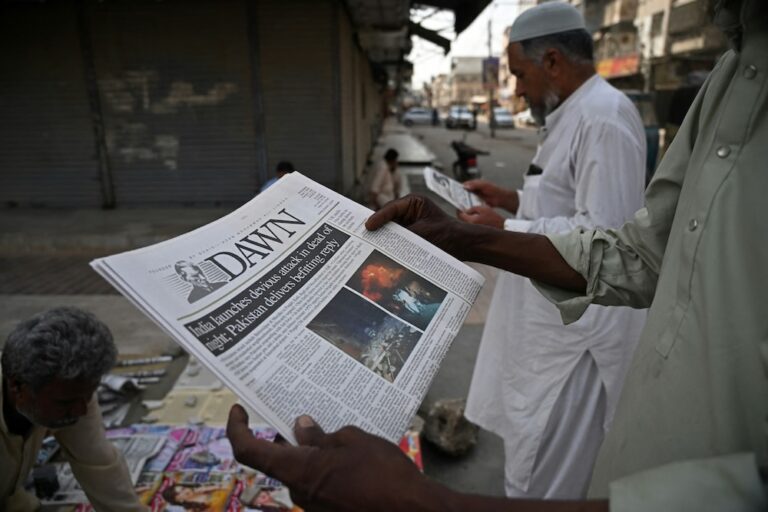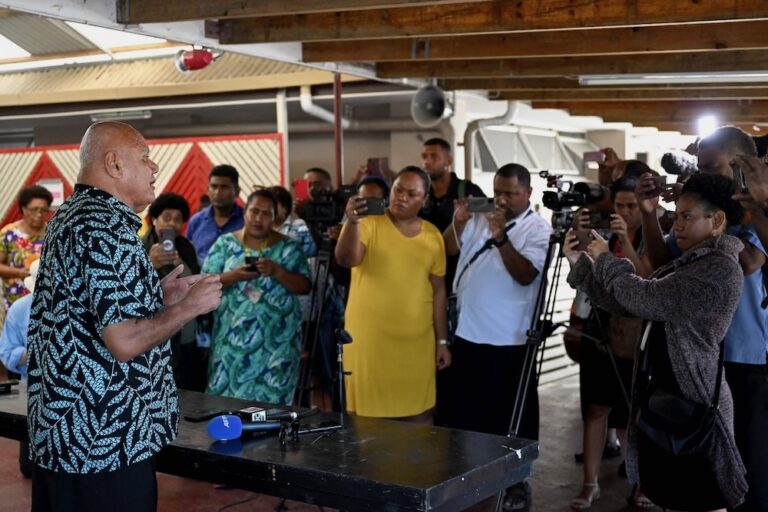November 2021 in Asia-Pacific: A free expression round up produced by IFEX's regional editor Mong Palatino, based on IFEX member reports and news from the region.
A Chinese tennis star has accused a former high-ranking member of China’s Politburo of sexual assault. Cambodia has released 27 prisoners, but this is probationary and they could be rearrested. Pakistan’s National Assembly has passed landmark legislation intended to protect journalists, but an amendment has rights groups concerned.
#MeToo in China: Tennis star Peng Shuai speaks out against abuse
On 2 November, Chinese tennis star Peng Shuai posted on social media platform Weibo that China’s former vice-premier Zhang Gaoli had sexually assaulted her twice in the past decade. After 20 minutes, her post was removed, her accounts were suspended, and keywords related to her allegations were censored by authorities.
Her sudden disappearance from the internet was flagged by her supporters, who expressed concerns for her safety. This sparked a global campaign using the hashtag #WhereIsPengShuai?
In response, state-affiliated Chinese media released photos and videos of Peng Shuai interacting with friends and fans. On 22 November, the International Olympic Committee (IOC) announced that it was able to talk to Peng Shuai and was assured about her safety.
But human rights groups remain unconvinced, since the Chinese government is known for making forced confessions. IFEX member Human Rights Watch criticized the IOC for its uncritical acceptance of the Chinese state’s claims.
“The IOC has vaulted itself from silence about Beijing’s abysmal human rights record to active collaboration with Chinese authorities in undermining freedom of speech and disregarding alleged sexual assault,” said Yaqiu Wang, senior China researcher at Human Rights Watch.
Groups like the Women’s Tennis Association and several prominent tennis players have urged the Chinese government to investigate the sexual assault allegations made by Peng Shuai. Chinese women’s groups have also rallied support for Peng Shuai.
Chinese journalist Zhang Zhan needs urgent medical care
IFEX joined the Coalition for Women in Journalism and other rights groups in urging the Chinese authorities to release journalist, activist, and former lawyer Zhang Zhan immediately.
Zhang Zhan was arrested in May 2020 after she posted critical video reports about the coronavirus outbreak in Wuhan. A court found her guilty of “picking quarrels and provoking trouble” and sentenced her to four years in prison. She protested her conviction through a hunger strike which severely affected her health.
Her family and friends are worried about her condition. Media and human rights groups have signed a petition calling for her urgent release on humanitarian grounds.
“The arrest of the journalist was condemnable to begin with. But to continue to keep her in prison, even as her life is at risk due to mistreatment by the state, is abominable.”
Myanmar releases journalist Danny Fenster
After 176 days in prison, United States journalist Danny Fenster is free.
Fenster, editor of Frontier Myanmar, was arrested six months ago over an alleged violation of immigration laws, part of a larger crackdown targeting activists, opposition leaders, and journalists who were deemed critical of the junta which had taken power in February. Two more charges were filed against him related to sedition and terrorism. In early November, he was sentenced to 11 years in prison for ‘unlawful association’.
The sentence triggered an international outcry, with Reporters Without Borders (RSF) accusing the junta of using Fenster “as a bargaining chip during secret negotiations with their foreign interlocutors.”
Conditional freedom for prisoners in Cambodia
Civil society groups in Cambodia welcomed the release of 27 activists and human rights defenders, and urged authorities to release the remaining 60 political prisoners who remain in detention. They assailed the decision to grant the release with probationary conditions such as prohibiting association with other political prisoners, regular reporting to authorities, and restrictions on speaking out on political issues.
They warned that the release does not remove threats against those who are advocating reforms in governance because of a “politicised judiciary” and the continuing use of repressive laws and decrees.
“While we celebrate these activists’ release, we also are reminded that their conditional release does not fix the structural injustices that they spoke out against prior to their arrest and that they and others remain under threat.”
Landmark legislation in Pakistan – undermined?
On 8 November, Pakistan’s National Assembly unanimously passed the Protection of Journalists and Media Professional Bill 2021. It is a landmark legislation that seeks to protect the safety, privacy, and welfare of journalists amid continuing work-related attacks against the media. In May, the Sindh Provincial Assembly had passed a similar bill, which created momentum for its adoption in the National Assembly.
Media groups, including IFEX member Pakistan Press Foundation (PPF), have collaborated and worked hard on the bill, engaging legislators, and promoting public awareness about the measure. It would create several mechanisms involving media stakeholders, many of which are aimed at enforcing measures to address impunity and violence against journalists.
On 10 November, PPF called the passage of the bill “a positive step forward for the safety of journalists and an end to impunity in crimes against journalists.”
“We commend the efforts of the government and the opposition in unanimously passing the bill,” it added.
But on 19 November, the Senate inserted an amendment in Clause 6 of the bill which states: “All journalists and media professionals must respect the rights and reputation of others and not produce material that advocates national, racial, ethnical, religious, sectarian, linguistic, cultural or gender based hatred which may constitute incitement to discrimination, hostility or violence.”
Media groups are profoundly concerned. RSF say this provision “neutralises virtually all the protection that it was supposed to provide” – since authorities can invoke its broad meaning to prosecute journalists.
A lethal month for media
Two individuals were killed in Pakistan in November after they reported on issues that implicated local authorities. On 3 November, the dead body of Nazim Jokhiyo was found near Karachi. He had previously posted videos of illegal hunting trips for Arab dignitaries. He mentioned receiving threats in his last video, but was determined to expose the crime he had documented.
“I am not scared. I am getting threats and I will not apologise,” he said in a video hours before his body was found.
On 8 November, blogger Muhammad Zada Agra was shot dead near his home in Sakhakot City in Malakand district. He previously reported on the drug trafficking activities of local criminal groups and the alleged protection they have been receiving from officials. Two suspects were arrested but media groups are demanding that the investigation should also include those who ordered the killing.
In India, Bihar-based journalist Avinash Jha went missing on 9 November. Three days later, his severely burned body was found by his family. Before his disappearance, he was investigating a local network of private medical clinics. According to RSF, he is the fourth journalist killed in India in connection with their work in the past six months.
In brief: Court rulings on freedom of expression
In India, SFLC.in published an explainer on the Supreme Court ruling regarding the petition on the government’s use of the Pegasus spyware for the surveillance of citizens. A technical committee composed of independent experts was ordered by the Court to probe the Pegasus spyware issue. SFLC.in said “this is a momentous victory for the cause of privacy and human rights in India.”
“The Order is a step in the right direction for ensuring that our democracy is not held a prisoner to the abuse of power by the Government.” SFLC.in
In Indonesia, the Constitutional Court has ruled that the government can block or throttle the internet during times of social unrest to prevent the “dissemination and use of electronic information and/or electronic documents that have prohibited contents in accordance with statutory provisions.” This reversed the June 2020 ruling of the Jakarta State Administrative Court, which declared that orders on internet shutdowns are unlawful – a ruling based on a 2019 petition filed by several groups, including IFEX member Aliansi Jurnalis Independen, which questioned the legality of the government’s decision to block the internet when protests erupted in Papua. Media groups say the recent order of the Constitutional Court will make it difficult for journalists to report on conflict or spread relevant information during crisis situations.
In Thailand, the Constitutional Court has ruled that the call for monarchy reform is tantamount to a demand for its abolition, hence it is unconstitutional. This could trigger more arrests, since the series of democracy protests in the country’s capital in the past two years were mostly organized by individuals and groups who wanted to reform laws related to the monarchy. Since last year, the government has used the lèse majesté law to arrest at least 154 individuals who have ‘insulted’ the monarchy. Six individuals who joined a November 2020 protest were charged this month with sedition and royal insult cases.
In Bangladesh, the International Federation of Journalists is asking authorities to drop the charges against photojournalist Shafiqul Islam Kajol after the Dhaka Cyber Tribunal decided to slap him with three separate offences under the notorious Digital Security Act (DSA). Kajol is accused of circulating defamatory materials about various ministers, lawmakers, and leaders of the ruling party on social media. This is the latest example of how DSA is being used to silence critics of the state.



